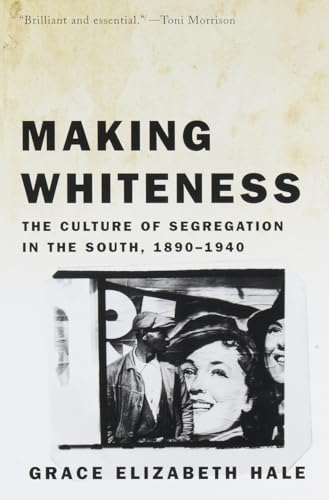Making Whiteness
The Culture of Segregation in the South, 1890-1940
Grace Elizabeth Hale
BOOK REVIEW

The impact of Making Whiteness: The Culture of Segregation in the South, 1890-1940 by Grace Elizabeth Hale reverberates through the corridors of history, igniting both a fire of understanding and a tempest of outrage that compels you to look deeper into America's past. It's not just a book; it's a shattering revelation of how race, identity, and culture have intertwined beneath the stark shadow of segregation. Hale's incisive exploration of the Southern landscape invites readers to confront the uncomfortable truths that have shaped contemporary American society.
Within the pages of this powerful text, Hale weaves an intricate tapestry of the social and cultural dynamics that defined the South in the early 20th century. Her meticulous research reveals how whiteness became a defining characteristic, an identity crafted and cultivated not through mere physical traits but through systemic structures of power, privilege, and oppression. As you delve into the text, you will witness the birth of a cultural identity steeped in exclusion, driven by the need to cement racial hierarchies that still echo in the contemporary discourse on race relations.
Hale doesn't shy away from the discomfort. She paints a vivid picture of an era where the cultural capital of whiteness was established through everything from literature to popular music, mainstream media to educational systems. The imagery she conjures is haunting; it evokes a world where black bodies were systematically dehumanized, while the white populace reveled in their constructed superiority. This harsh juxtaposition between the two races begs the question: what price was paid for the notion of whiteness?
The emotional landscape of Making Whiteness is punctuated by stories that breathe life into historical facts. As you traverse through the text, narratives of both white and black individuals emerge, forcing you to grapple with the moral implications of their experiences. Hale's ability to balance academic rigor with humanistic storytelling is nothing short of masterful. You might find yourself feeling anger, sadness, and even a sense of urgency as you connect the dots between history and its insidious presence in today's society.
Readers have been equally moved and polarized by this book, with some praising its boldness in tackling difficult truths while others criticize it for what they perceive as a lack of nuance. Critics highlight a discomfort with the notion that whiteness is a social construct, arguing instead for a discussion that includes varying experiences within whiteness. However, many voices rise in defense of Hale's arguments, applauding her dedication to unveiling the complexities of racial identity and challenging readers to confront their own preconceived notions. This dialogue surrounding the book fuels an important cultural conversation - one that desperately needs to be had to foster greater understanding and empathy.
As you engage with Making Whiteness, understand that Hale has provided not just a historical account but a lens through which to examine the ongoing racial dynamics within America. It's a call to arms against ignorance, a beacon of clarity in a fog of misunderstanding. The themes presented challenge you to confront uncomfortable truths about privilege, power, and identity, prompting a personal reckoning that could lead to profound change in both self and society.
In an era where discussions about race often become muddled and contentious, Hale's work serves as an essential guide. Her arguments resonate deeply, echoing in the hearts of those who yearn for change; you may find your own beliefs challenged and expanded in ways you never anticipated. The audacity of her inquiry into the cultural constructions surrounding whiteness is precisely what makes this book an essential read for anyone daring enough to navigate the turbulent waters of racial dynamics.
The urgency of this text cannot be overstated. It demands to be acknowledged, discussed, and dissected. The implications of Hale's work extend far beyond the pages, pushing readers to consider their own roles in a society still marred by the legacies of segregation and racism. As such, Making Whiteness is not just a historical analysis; it's a catalyst for conversation and, ultimately, a harbinger of change. You owe it to yourself to dive into this engrossing narrative and emerge with a greater understanding-because to ignore it would be to deny the realities of our shared history and, tragically, our ongoing struggle for equality.
📖 Making Whiteness: The Culture of Segregation in the South, 1890-1940
✍ by Grace Elizabeth Hale
🧾 448 pages
1999
#making #whiteness #culture #segregation #south #1890 #1940 #grace #elizabeth #hale #GraceElizabethHale